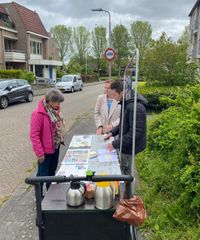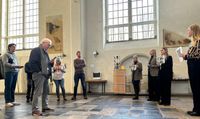Semester Placemaking
Approach
The Placemaking semester uses the design thinking philosophy, where you work on creating meaningful places in a self-directed and co-creative way. You are largely responsible for your own learning path, within which you will be supported by coaches and experts from the field in achieving set goals. By working on your facilitation skills, from a learning mindset, we want to enable you to work with others to create placemaking concepts that are of value to customers and to end users, in short, creating value for various stakeholders.
By exploring placemaking ideas and visiting inspiring examples in the field of placemaking, we work to transform public space and in this way give more meaning to a place for different users. You are challenged to co-create with end users within this design process. We will work as much as possible in the environment of the issues themselves, in order to be in close contact with the issues, which means that we do not standardly set up the studios within the school building.
Within the semester, you will be working on four different assignments: Place Vision, Meaningful Place, Facilitating Skills and The Legacy.
Key aspects within the semester
Co-creation
More and more municipalities, organizations or other bodies are recognizing the value of co-creation in certain processes. In creating sustainable concepts, it is important to involve end users in the creation and implementation of new meaningful concepts. The main purpose of placemaking is to initiate and facilitate a process whereby we collectively reinvent public spaces as the heart of any community: strengthening the connection between people and the places they share. To achieve this, cooperation is an important aspect, or co-creation. Within the creation of a placemaking concept, it is therefore crucial to facilitate as a placemaker in bringing people together, whether this concerns a brainstorming session, collecting input on a prototype or celebrating a success together. Co-creation does not happen automatically, you will have to invest a lot of time and energy in connecting with residents, students or entrepreneurs. But to create support, continuous co-creation is essential.
Co-creation - Goede Buur 2023
How do you let the consumer participate in the development of the concept and the final design? The ongoing involvement of the end user is a key element in creating a meaningful place. Be sure to use time and space to improve and enrich your design based on the end user's cues.
Co-creation - De Grote Kerk 2023
Iteration
Testing prototypes - Wirdumerpoort 2023
.png/picture-200?_=1907238fa54)

